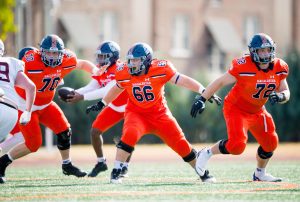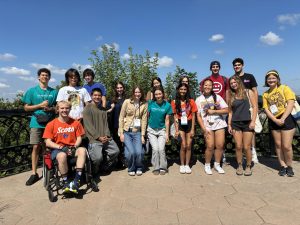Title IX, DML talk white supremacy and violence prevention with Malik Washington

November 12, 2020
The Department of Title IX, the Department of Multicultural Life and Sexual Violence Prevention Education co-hosted a Zoom conversation about accountability on campus with Malik Washington, director of Penn Violence Prevention at the University of Pennsylvania, on Tuesday, Nov. 10. The conversation was called Transgressing White Supremacy in Campus Prevention, Response, and Accountability.
Dean of Multicultural Life Marjorie Trueblood introduced Washington. Washington is an active abolitionist, supports Black feminism and community engagement and leads efforts to engage men in gender justice and anti-incarceration violence prevention.
Washington first discussed the role that sexual violence plays in furthering and maintaining white supremacist patriarchy throughout U.S. history and its present day implications on narratives and beliefs about sexual harrassment.
“The intention of this conversation is about transgressing dominant narratives [of who is being victimized] about binaries and around sexual violence —- who experiences it, and who can be responsible for it,” Washington said. “We want to name and identify that in transgressing violence [so] that we can create a world where violence does not exist. I remain committed to that world where these harms are not so dominating.”
Washington opened the Zoom chat to any questions about how white supremacy operates within sexual violence prevention on campus.
“[From stories that were coming up in the media reports] from prominent colleges and universities, oftentimes these may have been related to athletics in which they were alleged Black perpetrators of sexual harm or they were white men who were alleged to have caused the harm,” Washington said. “Many folks were surprised by that and able to really wrestle with what it means for white men on college campuses to be causing this kind of harm in sexual violence.”
Washington discussed the history of white supremacist violence and sexual assault in America, and how that has carried over to the US policing and prison system.
“Sexual violence is a critical component of imperialist colonialization in American slavery,” Washington said. “Both women and men were experiencing sexual violence in some cases. That was the explicit purpose or intent of ownership and control over bodies was for power in a sexualized way. This includes violence against indigenous people.”
Washington referenced “The Birth of A Nation” (1915) directed by D. W. Griffith, that was the first film shown in the White House. It used blackfaced white actors to depict the Ku Klux Klan’s racist ideology of protecting white women from Black men.
“This was one of the foundations itself of both withholding slavery and pushing back against reconstruction that happened after the Civil War, which was that there could not be an equal society, because of the threat that Black people pose to white folks and specifically within the context of Black men causing sexual harm to white women…or in consensual relationships.”
From there, Washington discussed the U.S.’s history of violence and white supremacy, pointing to the criminal execution of George Stinney in 1944, the murder of Emmet Till in 1955 and the Greenwood Massacre in Tulsa Oklahoma in 1921.
He pointed to a specific ideology that perpetuated understandings of violence, as well: the Ku Klux Klan’s narrative of protecting white women from Black men.
“Between the years of 1930 and 1967, of the 455 men who were executed on the basis of a rape conviction, 405 of them were Black,” he said.
Washington raised the point that, today, Black women are being left out of sexual assault prevention, response and accountability. He noted that a lot of sexual violence justice and prevention has been centered around white women in the past.
“There has been little to minimum response to the sexual violence that Black women were experiencing, which I think makes the carceral system illegitimate,” Washington said. It’s not preventing harm when it is responding to it in a way that is accurate and authentic.”
Washington referenced Associate Justice of the Supreme Court Clarence Thomas’s allegation of sexual assault against Anita Hill.
“This is a circus… It’s a national disgrace from my standpoint as a Black American,” Thomas said about the Equal Employment Opportunity Committee. “It is a high-tech lynching for Blacks who in any way deign to think for themselves.”
During the hearing of Hill the council member Kimberly Crenshaw said, “He said it was a high tech lynching, and nobody in their right mind stopped to ask what a Black man has ever been lynched for something that a Black woman said.”
Washington’s presentation then turned to an anti-carceral lens for violence prevention, response, and accountability. Washington noted that the Violence Against Women Act (VAWA) of 1994 put 85 percent of its funding towards policing and punishment from as recently as 2013. Both President-elect Joe Biden and former Secretary of State Hillary Clinton advocated and signed on to this act.
“This Act had a devastating effect particularly in communities of color in terms of policing and mass incarceration,” he said.
Washington cited evidence showing that policing and imprisonment don’t prevent sexual violence. Instead, he said, prisons perpetuate a cycle of violence.
“I struggle with the idea of how we are transcending transgression and transgressing violence if the only way in which we know or have to respond to these issues is violence itself,” Washington continued.
Washington then turned his discussion to campus issues, emphasizing working towards accountability for sexual violence on campus. He noted that we are usually most equipped to address violence in our own communities among the people we know personally.
“That is always a difficult thing to wrestle with because that means we are acknowledging that we always, always know somebody… who has experienced sexual violence or somebody who has actually caused this harm,” Washington said. “That means we also have some type of power to address that ignorance and misunderstanding.”
“Fear and uncertainty around accountability is the largest barrier to effective response and prevention,” Washington continued.
He then outlined the sexual violence prevention pyramid, a system for thinking of different levels of violence prevention. The levels include preventing violence before it happens and long-term responses to violence.
Washington asked the Zoom call participants to define what accountability means to them in the chat.
Rachel Weeks, department coordinator for the Civic Engagement Center and a staff Title IX adjudicator, wrote, “[Accountability is] recognizing that violence and mental illness is often, not always, the result of trauma.”
Nasara ‘23 wrote, “Accountability: being aware of and taking responsibility for the ways that you have, can, and do impact the issue.”
“I continue to believe that the most effective response to accountability in campus violence is going to be led by students,” Washington said.
Washington ended his presentation with a relevant readings list that included “Women, Race, and Class” by Angela Y. Davis, “Black Feminist Thought” by Patricia Hill Collins and “Until We Reckon” by Danielle Sered. The conversation concluded with a question and answer session about how Macalester can affect its own accountability.
“Moving forward we know that consent is about more than just sex,” Washington said. “[It]’s supporting people in their own processes in our own community and collective responsibility, realizing that we all have a role within that.”
There will be a follow-up workshop with Washington about restorative and transformative justice processes in the spring semester.
For more information about Sexual Violence Prevention at Macalester go to https://www.macalester.edu/healthandwellness/sexual-violence-prevention-education/
To reach the Department of Multicultural Life: https://www.macalester.edu/multiculturallife/#/0
For Macalester’s Title IX Department go to: https://www.macalester.edu/titleix/










